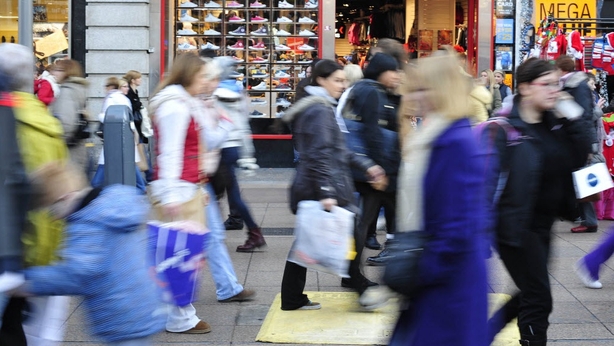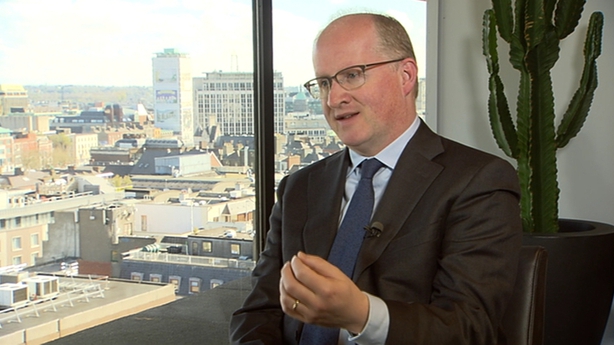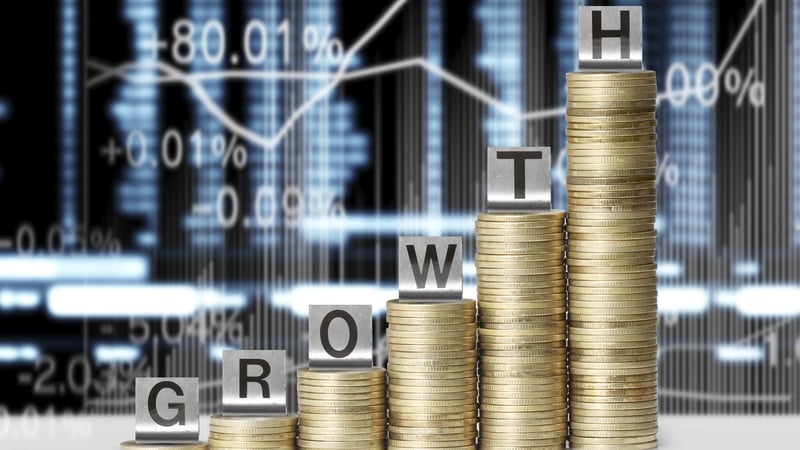The economy grew by 0.6% in the three months to the end of June on a quarterly basis to stand 4.1% higher than a year ago, new figures from the Central Statistics Office show.
Today's figures show that both GDP and GNP rose by 0.6% in the three months from April to June.
They show that consumer spending in the three month period fell by 0.5% after growing by 0.7% in the previous three month period, less than originally estimated.
However, investment jumped by 38.9%, reflecting increased imports of intellectual property products.
As a result, overall domestic demand rose by 9.1% but net exports, normally one of the main drivers of economic growth, contracted by 31.4%.
Today's figures also show that Government expenditure increased by 5.2% during the quarter.
They also reveal an increase of 5.2% in the building and construction sector in the second quarter compared to the same time last year, while the distribution, transport, software and communications sector increased by 1.7%.
Agriculture rose by 1.5% while public administration and defence recorded an increase of 1.3% in real terms, the CSO added.
"After the extraordinary step shift of 2015, it looks like the economy is reverting to what is still very strong growth by international standards," KBC Bank Ireland's chief economist Austin Hughes said.
"But it may be a little more moderate than previously envisaged. It looks like we might see growth of around 4% for the year," he added.
The CSO data in July also showed that first quarter GDP fell by 2.1% on a quarterly basis despite all other secondary data suggesting three months of growth and those figures were unchanged today in the latest figures.
Even before last year's revisions, Irish economic growth outpaced the rest of Europe for the last two years and will do so again this year if the Government meets its forecast for an expansion of 4.9%.
Commenting on today's CSO figures, Davy economist Conall MacCoille said that the modest growth in in the second quarter was "disappointing" given the 2.1% contraction in Q1 GDP has been left unrevised.
The economist said that the first quarter figure "seems artificially weak in view of the 1% employment growth over the same period and with the composite PMI averaging close to 60".
"There was also an extremely surprising 0.5% fall in consumer spending, which seems hard to credit given buoyant retail sales. On balance, we still believe the underlying rate of GDP growth is closer to 5% and that the recovery accelerated in H1 2016," he added.

Meanwhile, the CSO has announced details of the expert group to look at developing more accurate economic statistics to measure the economy.
The relevance of using GDP to measure the true health of the economy was called into question in July when growth for 2015 was revised up to 26% after a massive revision to the stock of capital assets.
In a statement today, the CSO said there was a need to develop a broader suite of domestically focused indicators and information to supplement internationally agreed indicators
The CSO said that the small, open and highly globalised nature of the Irish economy made it increasingly difficult to represent the complexities of economic activity in Ireland in single headline indicators such as GDP or GNP.
"The CSO is committed to meeting user needs and is convening an expert group that will develop recommendations on how best to meet the statistical needs of national users and provide guidance on the development of indicators that can provide the necessary insights," commented Jennifer Banim, Assistant Director General with responsibility for Economic Statistics.

The group will be chaired by Central Bank Governor Philip Lane and includes the ESRI's Alan Barrett, UCC's Seamus Coffey, Thomas Conefrey from the Irish Fiscal Advisory Committee and John Fitzgerald from Trinity College Dublin.
The Department of Finance's John McCarthy is also in the group, while Dan O'Brien from the Institute of International and European Affairs in Dublin, IBEC's Fergal O'Brien, Frances Ruane from the European Statistical Advisory Committee, SIPTU's Marie Sherlock, Rossa White from the National Treasury Management Agency and Jennifer Banim and Michael Connolly from the Central Statistics Office.
The group also includes international observers from the European Union's statistics office Eurostat and the International Monetary Fund.
It will meet between September and November of this year and will report to the Director General of the CSO.
The CSO said the group's report will be published along with its response to it.
Separate figures from the CSO today on the country's Balance of Payments show there was a current account surplus of €4.6 billion in the quarter.
This was down on the €7.5 billion current account balance on the same time last year, mainly as a result of increased imports of intellectual property.
